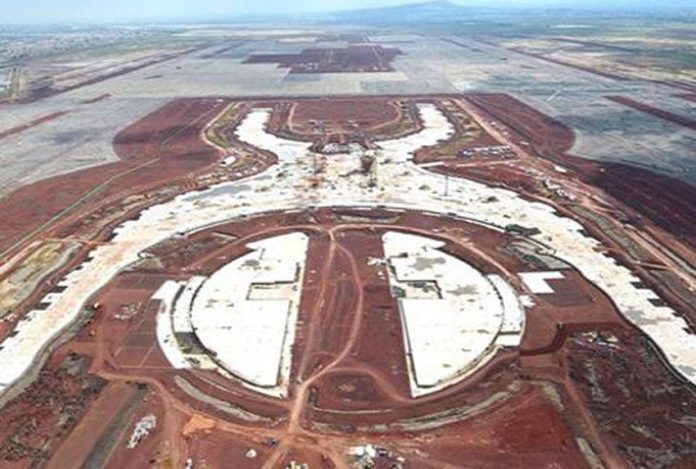Mexico City architects have joined the chorus of criticism against president-elect López Obrador’s decision to scrap the partially-built Mexico City International Airport.
López Obrador confirmed Monday that the 285-billion-peso (US $14 billion) project would be canceled after about 70% of people who participated in a public consultation voted to build two new runways at an air force base and upgrade the existing airport and that in Toluca rather than continue with the new airport.
Only one of 90 voters on the electoral list cast a ballot in the four-day public vote, which concluded Sunday.
“The outcome confirms Mexico is lacking democratic processes,” architect Fernanda Canales told architecture and design magazine Dezeen.
“It’s an example that reveals projects in Mexico are based on short-term, personal and political issues and corruption,” she added.
“It was not a public referendum, it was fake, completely against the law. The Supreme Court should approve it and the National Electoral Institute should be in charge. Instead, it was not a transparent process.”
The new airport, located on an ancient lakebed in the México state municipality of Texcoco, is somewhere between 20% and 35% complete.
It was designed by British architectural firm Foster + Partners in collaboration with Mexican studio Fernando Romero Enterprise.
Romero is the son-in-law of Carlos Slim, Mexico’s richest man and a key investor in the airport project.
The private sector also slammed the move to scrap the airport, considered outgoing President Enrique Peña Nieto’s signature infrastructure project.
Canales charged that López Obrador’s decision was politically motivated.
“[The public consultation] does not reveal the desires of the population, but rather of the future president and battles among political parties,” she said.
“It only alerts us that decisions will not be based on information, research, long-term views, sustainable development, economy . . . but rather on personal interests.”
Christopher Koehn, who is also an architect in the capital, said “the main reason for López Obrador to take [the airport] down is to justify himself,” adding that placing the fate in the hands of a largely uninformed public was unwise.
“Political or public referendums shouldn’t be part of this decision. Most voters don’t really know about urbanism, city planning or architectural design, or in this case, the real airport necessities.”
Gabriela Carillo, a partner at the firm Taller de Arquitectura, agreed, saying that “a decision at that scale shouldn’t be taken by people without information — and I’m included there.”
Isabel Martínez Abascal of Lanza Atelier said the vote was a “brave and democratic initiative” but added that more should have been done to educate citizens about the relevant issues.
“Recognizing the right of citizens to opine should go hand in hand with providing them with the basic tools to do so,” she said.
“That includes technical information adapted to people who are not necessarily architects or urban planners, with a sociological approach and that considers the benefits and problems in the short, medium and long term.”
During the early part of the election campaign, López Obrador frequently railed against the airport project, charging that it was corrupt, too expensive and being built in an unsuitable place.
However, a project manager at the National Autonomous University (UNAM) Faculty of Architecture said that López Obrador’s criticism was “propaganda.”
“Most of the propaganda that [soon-to-be ruling party] Morena has used to convince its sympathizers has to do with those arguments about the so called ‘lake’, swindling people into believing that those wetlands have ecological significance, and that 0.77 per cent of Mexico’s population decided for the greater good,” Diego Guerra said.
“We are all worried, inside the school and outside, being that this [decision] doesn’t adhere to any of the correct practices we work towards.”
Source: Dezeen (en)
